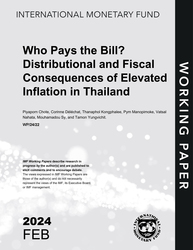
Who Pays the Bill? Distributional and Fiscal Consequences of Elevated Inflation in Thailand
Who Pays the Bill? Distributional and Fiscal Consequences of Elevated Inflation in Thailand
READ MORE...
Volume/Issue:
Volume 2024
Issue 022
Publication date: February 2024
ISBN: 9798400266485
$20.00
Add to Cart by clicking price of the language and format you'd like to purchase
Available Languages and Formats
| English |
Prices in red indicate formats that are not yet available but are forthcoming.
Topics covered in this book
This title contains information about the following subjects.
Click on a subject if you would like to see other titles with the same subjects.
Inflation , Economics- Macroeconomics , Economics / General , Inflation , poverty , inflation dynamics , income effect , fiscal cost , , elevated inflation , inflation component , rising prices , energy price , Income , Energy prices , Consumption , Food prices , Global , Asia and Pacific
Summary
This paper analyzes the distributional impacts of inflation in Thailand. For that aim, the paper uses rich micro-survey data on 46,000 Thai households to study the effect of the recent elevated inflation on poverty, its distributional effects on different income levels, and the fiscal cost to compensate households from real income losses. To study the multidimensional impact of inflation, the paper also studies how inflation differentially affects households through the consumption, income, and wealth channel. The analysis shows that under a baseline scenario, poverty in Thailand could increase by 1.3 percentage points—about 900,000 people—in the absence of government intervention. Targeted fiscal support to only compensate households that are below the national poverty line from rising inflation amount to 0.05 percent of GDP. However, fiscal support to compensate relatively rich households, defined as those above the median of the income distribution, amount to 1.4 percent of GDP. Moreover, due to high levels of debt, richer households benefit from inflation relative to poorer households. Finally, the paper also delves into policy responses undertaken by the Thai government and Asian and emerging economies to mitigate elevated inflation.
Copyright © 2010 - 2026
Powered by:
AIDC



